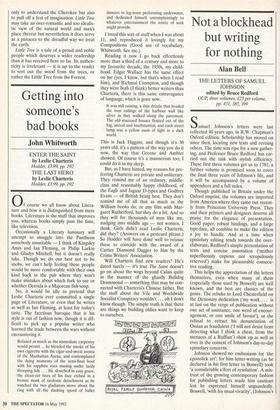Getting into someone's bad books
John Whitworth
0 f course we all know about Litera- ture and how it is aistinguished from mere books. Literature is the stuff that improves you, whereas books simply pass the time, like television.
Occasionally a Literary luminary will attempt to smuggle into the Pantheon somebody unsuitable — I think of Kingsley Amis and Ian Fleming, or Philip Larkin and Gladys Mitchell, but it doesn't really take. Though we do our best not to be snobs, we can't help feeling these people would be more comfortable with their own kind back in the pub where they won't make mistakes about which fork to use or whether Derrida is a Majorcan fish soup.
No, it would be idle to pretend that Leslie Charteris ever committed a single page of Literature, or even that he writes as well as Ian Fleming, at least for today's taste. The facetious baroque that is his style is out of fashion now, though it is dif- ficult to pick up a popular writer who learned the trade between the wars without encountering it.
Relaxed as much as the immediate carpentry would permit ... he blended the smoke of his own cigarette with the cigar-and-sweat aroma of the Manhattan Arena, and contemplated the dying moments of the semi-final bout with his sapphire eyes musing under lazily drooping lids . . . He slouched in easy grace, the clean-cut lines of his face etched in a bronze mask of sardonic detachment as he watched the two gladiators move about the ring with all. the slashing speed of ballet dancers in leg-irons performing underwater, and dedicated himself uncomplainingly to whatever entertainment the soirée of sock might provide.
I loved this sort of stuff when I was about 11, and reproduced it lovingly for my Compositions (Good use of vocabulary, Whitworth. See me.) Reading it now I go back effortlessly more than a third of a century and more to my favourite decade, the 1950s, my child- .hood. Edgar Wallace has the same effect on me (yes, I know, but that's when I read him), and Richmal Crompton, and though they Were both (I think) better writers than Charteris, there is this same extravagance of language, which is gone now.
It was still raining, a thin drizzle that beaded the iron railings of the harbour wall like silver as they walked along the pavement. The old stuccoed houses floated out of the fog, unreal and insubstantial, and each street lamp was a yellow oasis of light in a dark world.
This is Jack Higgins, and though it's 30 years old, it's a pattern of the way you do it now, the way that Greene and Ambler showed. Of course it's a mannerism too; I could do it in my sleep.
But, as I have hinted, my reasons for pre- ferring Charteris are private and unliterary. They remind me• of an ordinary, middle- class and reasonably happy childhood, of the Eagle and Jaguar D-types and Godfrey Evans — of British being best. They don't remind me of all that as much as the William books do, or any film with Mar- garet Rutherford, but they do a bit. And so they will for thousands of men like me, nudging into middle age — not women, I think. Girls didn't read Leslie Charteris, did they? (Answers on a postcard please.) So Hodder will have done well to reissue these to coincide with the award of a Cartier Diamond Dagger to him by the Crime Writers' Association.
Will Charteris find new readers? He's dated surely — it's true The Saint doesn't go on about the wogs beyond Calais quite in the manner of the ghastly Bulldog Drummond — something that may be con- nected with Charteris's Chinese father. But the stuff about the Vile and Worldwide Socialist Conspiracy wouldn't. . . oh I don't know though. The simple truth is that there are things we budding oldies want to keep to ourselves.


















































 Previous page
Previous page